Community security


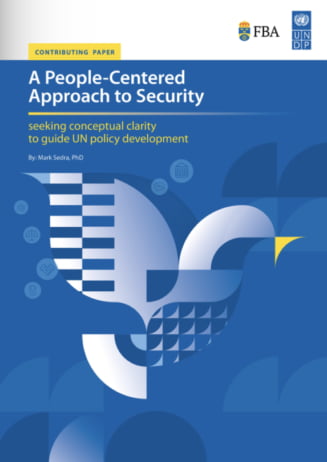
Overview
After several years of declining violence levels, in 2022, political violence increased by nearly 30 percent. The global context became ever more challenging with the war in Ukraine, coups d‘état and attempted coups d‘état in Burkina Faso, Guinea-Bissau and Peru, the presence of private military and security contractors in the Central African Republic and Mali, and turmoil and instability in Afghanistan, Myanmar, Guinea (Conakry) and Sudan.
While the widespread political tension and fragility impacted UNDP’s strategic and programmatic engagement on security, the organization stayed the course towards people-centred security promoting solutions that strengthen state institutions in line with people’s needs.
Country and programme support provided in 2022 by UNDP’s Global Programme for Strengthening the Rule of Law, Human Rights, Justice and Security for Sustainable Peace and Development included a wide range of thematic areas, such as community policing, combatting sexual and gender-based violence, security sector reform and governance, citizen security, and control of small arms and light weapons.
Policy development: promoting people-centred security
To enhance its support to the security sector, UNDP continued policy development around people-centred security as a guiding principle and a cross-cutting approach. A paper on “A People-Centered Approach to Security: Seeking conceptual clarity to guide UN policy development” was published jointly with the Folke Bernadotte Academy (FBA), the Swedish government agency for peace, security and development. With FBA, UNDP moderated a technical high-level discussion on the implementation of the people-centred security from the perspective of non-UN actors: the Geneva Centre for Security Sector Governance (DCAF) and Saferworld, an international non-governmental organization.
In addition, UNDP conducted a mapping exercise to identify and understand the impact of its programmes with the people-centred security components. This exercise highlighted the need for an integrated and rights-based approach to people-centred security programmes within the broader governance and rule of law portfolios, and to accomplish its SDG16+ integrator role.
UNDP also contributed to events and discussions around policy development on security, particularly for security sector reform and governance (SSR/G). A major workstream in 2022 was the HDPP funded project “Advancing Policy Tools for Sustainable SSR,” implemented by the Security Sector Reform unit of the Office of Rule of Law and Security Institutions (OROLSI/DPO) in collaboration with UNDP and the World Bank Group (WBG). The project aims to enhance the collective outcomes of the UN-WBG partnership on the security-development nexus through fostering a shared understanding of security related risks and conflict drivers. Also on the project agenda is the development of policy and guidance for the UN to mitigate those risks more effectively in fragile, conflict-affected and vulnerable settings, prevent conflicts and collaborate with the WBG to build more sustainable and affordable security sectors. Ten policy papers were finalized and will be published in 2023, in addition to a Briefing Paper to UN leadership on strengthening UN collaboration with the World Bank on SSR/G.
Lessons learned
Inclusivity and field-oriented methodology and processes are crucial for successful policy development. However, there is a need for more resources to accelerate the process and ensure agility in responding to the emerging issues relevant to the people-centred security policy development.
Looking forward
A broader UNDP policy on people-centred justice and security will be developed in 2023 followed by guidance materials to support the implementation of the approach at country level.
In addition to the continued efforts on policy development on SSR/G, UNDP will focus on gaining more traction from UN leadership in this area, according to the recommendations of the latest Secretary-General’s report on Strengthening Security Sector Reform.
Support to the policing services and the security sector reform/governance (SSR/G)
The focus of UNDP’s support to SSR/G and policing has been on strengthening the security actors (state and non-state), enabling them to provide effective, accountable and inclusive services with respect to human rights and the rule of law.
In 2022, UNDP supported community policing initiatives in Lebanon where 225 municipal police stations adhered to at least one of the five core components of the community policing as defined by the national policy developed with the support of UNDP. In Tunisia, the national model of community policing was rolled out in a new location (Zarzis municipality) in the South-East of the country.
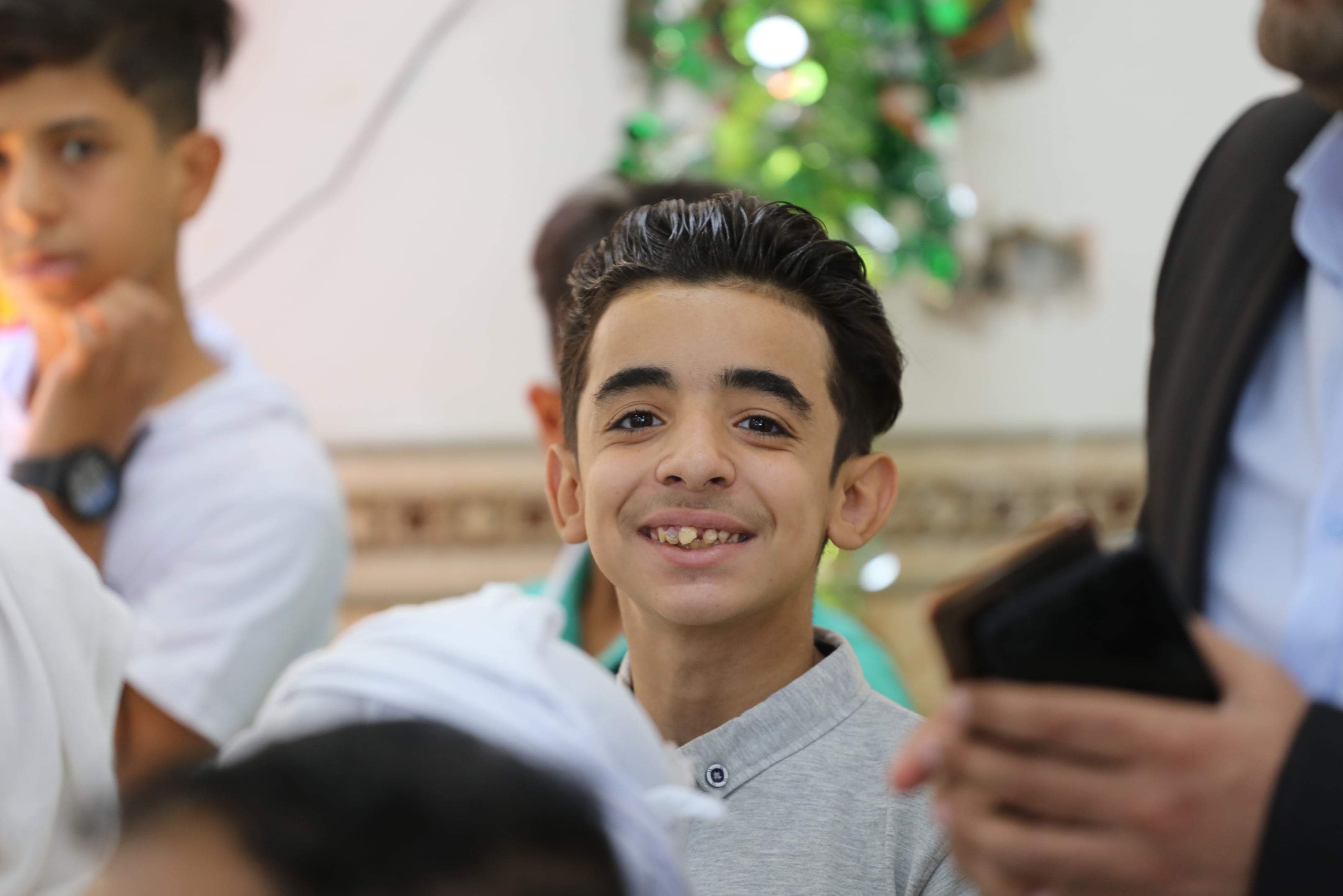
Youth participating at the Open Day in a Model Police Station, Ramadi, Iraq
To ensure that security institutions provide more effective services tailored to the needs of the communities they serve, UNDP supported the rollout of the sixth model police station in Iraq and the third one in Guinea-Bissau, in the Gabu region, improving the service delivery of the law enforcement agencies.
Gender sensitive approaches have been streamlined in UNDP’s support to the security forces in Iraq where women’s equal participation in security services remains an important goal of the SSR, and in the Central African Republic where a specialized police unit on sexual violence (UMIRR) was established with gender equality and non-discriminative access to justice for women at its core. In 2022, the UMIRR central unit of Bangui received over 3,000 complaints, 80 percent of which were from women. Based on these complaints, the unit started 328 investigations and transmitted 501 cases of sexual and gender-based violence to the prosecutor, leading to 48 cases tried in criminal sessions.
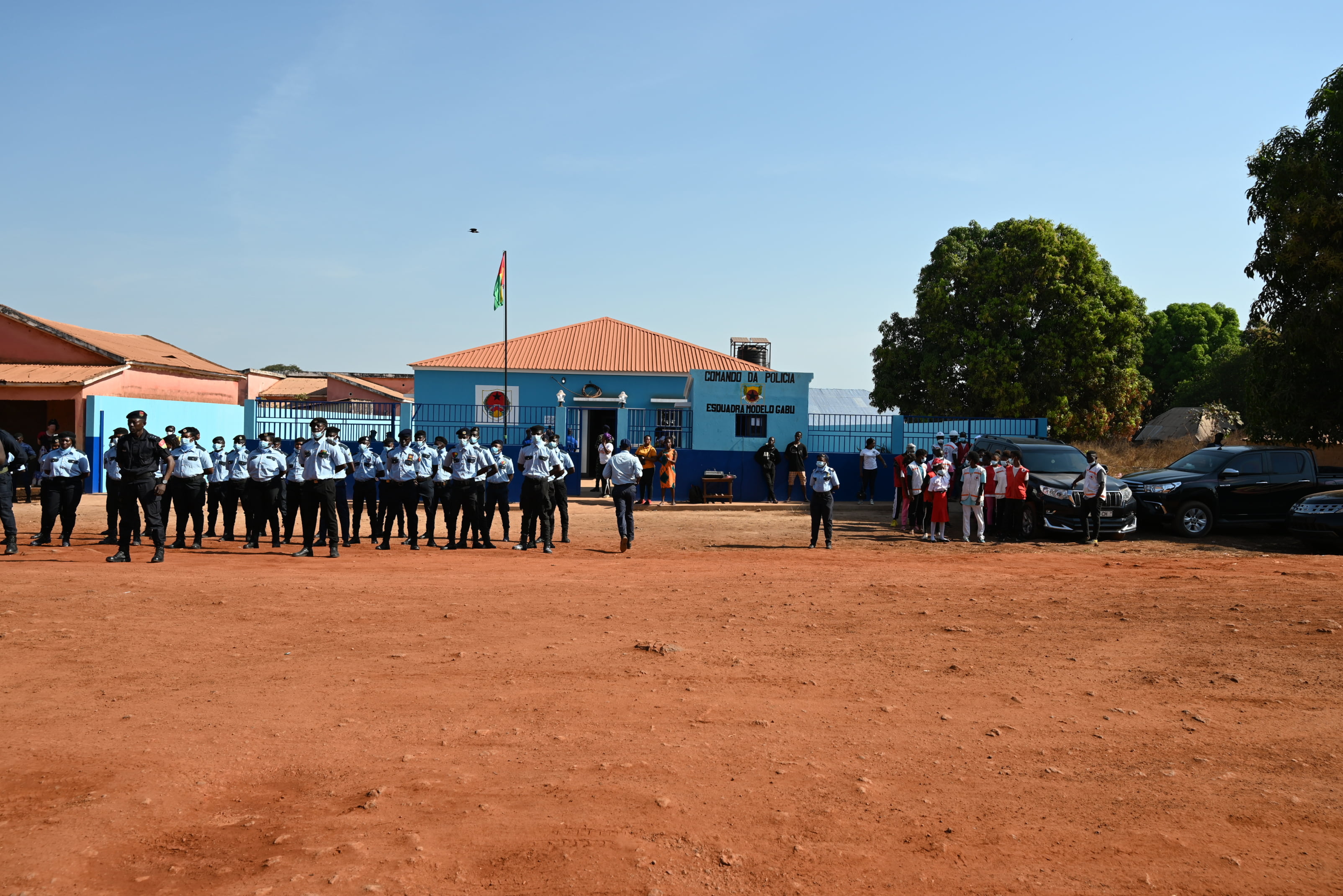
Model Police Station in Gabú Region, Guinea-Bissau
Strengthening trust between the population and the security services is one of UNDP’s main objectives. For example, in Burkina Faso, UNDP operationalized a committee composed of the authorities, security services, civil society organizations (CSOs), traditional and religious leaders. With its divisions at the national, sub-national and local levels, the committee managed to prevent ten intra- and inter-community conflicts on land matters and agriculture damage and resolve 25 disputes in six regions.
Finally, oversight and accountability mechanisms and human rights approaches have been reinforced with UNDP’s support in Lebanon and Sudan.
Lessons learned
Despite the positive impact of people-centred security programmes, in certain contexts their implementation faces numerous challenges. For example, in the remote areas of some countries where the legitimacy of the national authorities is contested, it is yet to be seen how to achieve national ownership while ensuring inclusivity and the use of local knowledge in programme design and implementation.
Looking forward
UNDP will further strengthen its programmatic response to insecurity and violence through more integrated, multidimensional and people-centred programmes, with more contextualized, conflict-sensitive and politically smart solutions.
Supporting Citizen Security in Latin America and the Caribbean
Citizen Security is UNDP’s programmatic framework for its rule of law, access to justice, security and human rights work in the Latin America and Caribbean region implemented through the “INFOSEGURA” and “CariSECURE” regional projects. Their objective is to improve democratic citizenship, address persistent insecurity, promote evidence-based policymaking and programme development in national institutions, and offer innovative solutions and knowledge.
In the Caribbean, CariSECURE´s flagship initiative in 2022 was the rollout of the Police Records Information Management System (PRMIS) in five countries. PRIMS is an open-source, web-based, integrated crime and justice information management system capable of capturing, storing, querying and retrieving crime incident reports. In Grenada, for example, the police started using PRMIS to improve criminal trend analysis. The system allows information on offences from the police stations to be pulled, organized in a dashboard, mapped geographically and compared with previous periods.

Innovation
Partnership
In Central America, INFOSEGURA supported the development of a digital assistant (bot) called SARA that provides information and guidance on the risk of violence against women, girls and adolescents. The project also supported the organization of 39 events and exchange of best practices, including a high-level discussion on citizen security and six campaigns on sexual and gender-based violence prevention. Over 800 government officials and civil society representatives (40 percent women) participated in a training on information gathering, analysis, use and dissemination. Additionally, over 60 knowledge products on citizen security, justice and social cohesion were developed.
INFOSEGURA also coordinated knowledge sharing on citizen security, through 15 DatAction sessions, 12 inter-country bilateral exchanges, involving 31 countries and 15 public institutions, hosted by its TrainAction online platform, developed in partnership with the United States Agency for International Development (USAID).
In terms of impact, Latin America exhibits heterogeneous trends in homicide rates: while some countries register reduction, others report increase. The downward trend in homicides was registered in the subregion of Central America and the Dominican Republic. The overall regional rate fell by 1.6 points and went from 20.0 to 18.4 homicides per 100,000 inhabitants, the lowest in the last nine years.
Lessons learned
The strong commitment of the project managers, who have driven the projects at the national level and provided important information on what was happening locally, was key to the success of CariSECURE. The design of CariSECURE 2.0 has sought to build on this success by expanding this approach to identify strong national focal points involved in youth crime prevention and response. Moreover, adapting programme targets to changing realities on the ground is paramount to project success and should be embedded in the stakeholder engagement strategy.
Looking forward
INFOSEGURA launched a joint initiative with SIGOB supporting the implementation of a regional tool, the SALVE Module (Education Violence Alert System) in El Salvador. This tool will allow the reporting acts of violence affecting the educational community in more than 6,000 public and private schools. The tool will also enable coordination between the Ministry of Education and the National Civil Police to ensure an efficient and effective response to cases reported through this system.
The second phase of CariSECURE (CariSECURE 2.0) will address crime and violence among youth and human trafficking by employing a multi-pronged human rights-based approach designed to improve national capacities for crime reduction, building upon the data gathering and analytical capacities provided to national police forces under CariSECURE 1.0.
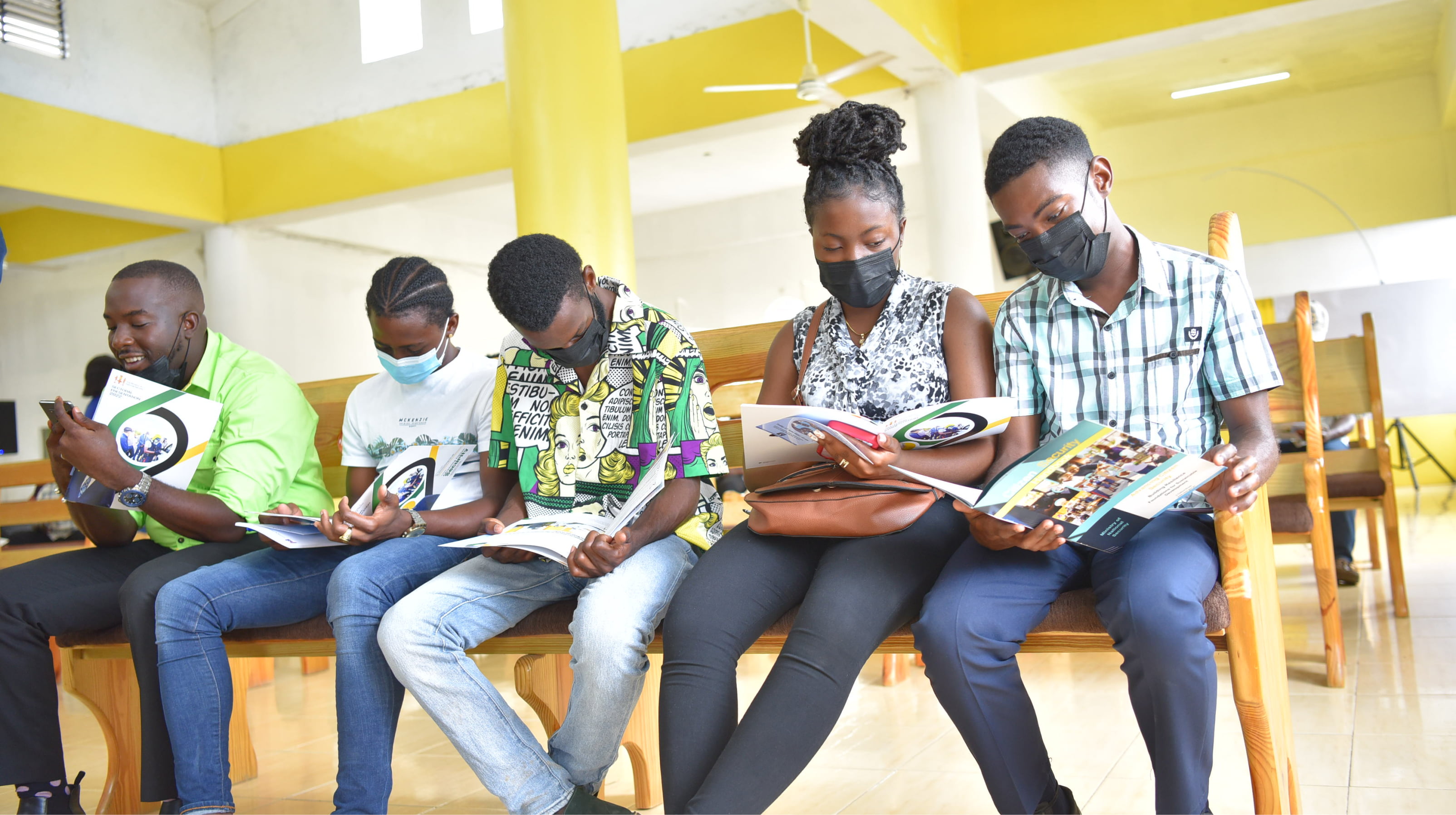
Children from the Denham Town Community attending the launch of the SALIENT Joint Programme
In 2022, SALIENT operations focused primarily on the three pilot countries: Cameroon, Jamaica and South Sudan.
- In Cameroon, UNDP and UN Women carried out trainings to civil society organizations (CSOs) and media on small arms and light weapons to raise awareness of the armed violence impact on vulnerable groups. The project team has ensured the representation of women and youth in training and sensitizations to ensure gender equality, women’s empowerment, youth inclusion and responsiveness. The Government of Cameroon has endorsed the establishment of a National Committee on Disarmament, Demobilization and Reintegration (DDR), a strong institutional level change fostered by SALIENT.
- In Jamaica, SALIENT is implemented by UNDP, the UN Educational, Scientific and Cultural Organization (UNESCO), the UN Office on Drugs and Crimes (UNODC) and the UN Regional Centre for Pace, Disarmament and Development in Latin America and the Caribbean (UNLIREC). The Caribbean Firearms Roadmap was finalized, enabling the Government to initiate the process for the formal adoption of the National Action Plan to combat the illicit trafficking, and prevent and mitigate the proliferation of small arms and light weapons in Jamaica. The national legal framework on firearms was reviewed with SALIENT support, and the capacity of 19 representatives of criminal justice institutions to counter illicit firearms trafficking was improved, contributing to the progress towards better arms control in the country. In addition, 45 at-risk youth (44 percent were women) were trained to facilitate peaceful conflict resolution and reduce armed gang violence. More than 80 government officials (80 percent were women) participated in national discussions to ban arms from schools.
- In South Sudan, UNDP and the UN Mission in South Sudan (UNMISS), in collaboration with the National Police Service, completed a small arms baseline and perception survey on the operationalization of disarmament. The survey identified target communities, provided recommendations and outlined national priorities. Technical level meetings were held to agree on the next steps, and key focal points were identified in target states. Escalating security and political challenges in the country have caused initial delays in the project implementation.
The activities in these pilot countries were extended beyond the initial implementation period due to the factors external to the project, such as the COVID-19 pandemic, escalating insecurities and operational difficulties on the ground.
Additionally, in 2022, SALIENT oversaw an in-person exploratory scoping mission for Honduras, where UNDP and UNLIREC identified country priorities on armed violence and SALW reduction, and started the design of a project proposal.
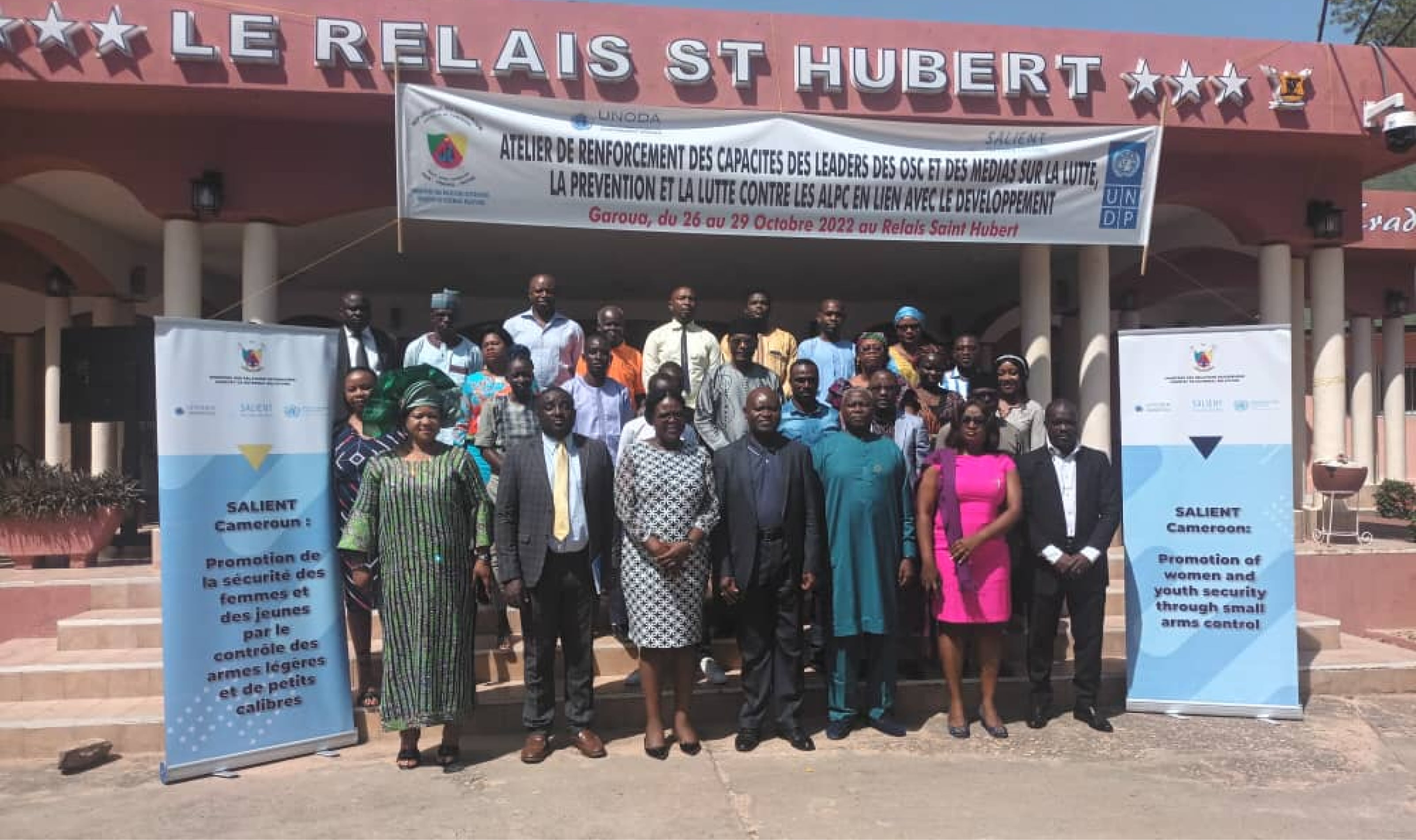
Training for journalists and civil society in the northern regions of Cameroon
Looking forward
In 2023, SALIENT will be implemented in Honduras and two countries from Central Asia and Asia Pacific regions. Ongoing activities in pilot countries will be completed with a follow-up exercise to identify best practices and lessons learnt to share further and foster South-South cooperation.
SALIENT activities have been made possible through the contributions of the Governments of Finland, France, Germany, Japan, New Zealand, Sweden and Switzerland.

Technical support
Strategic support
Funding support
Partnerships
Policy support and development
Knowledge and thought leadership
Agile capacities
SEESAC: small arms control for a safer South-East and East Europe
In spite of the significant progress made in the last two decades and in light of the war in Ukraine, the South-Eastern and Eastern Europe (SEE) region continues to face challenges related to illegal possession, misuse and trafficking of small arms and light weapons (SALW) and ammunition. Between 2019 and 2022, a total of 536 people died as a result of firearm misuse in the Western Balkans; there were 121 firearm related deaths resulting from domestic violence; 95 suicide deaths by firearms; and 56 people lost their lives in accidental shootings in the Western Balkans.4 At the same time, over 52,000 firearms were destroyed between 2018 and mid-2022; over 22,000 pieces of SALW were seized and over 136,000 voluntarily surrendered.5
In 2022, SEESAC continued monitoring and coordinating the implementation of the Roadmap for a sustainable solution to the illegal possession, misuse and trafficking of SALW and their ammunition in the Western Balkans. SEESAC also conducted the mid-term review of the implementation of the roadmap that confirmed its effectiveness and relevance, increased coordination and noted that the progress towards the roadmap’s objective was on track.
Coordination of resources provided for the Roadmap implementation was ensured through the Western Balkans SALW Control Multi-Partner Trust Fund, for which SEESAC serves as a Secretariat responsible for its programmatic coordination and monitoring. The fund is closing the year with the portfolio of US$24,162,531 and 14 ongoing projects implemented by UNDP and the UN Office on Drugs and Crimes (UNODC).
SEESAC continued supporting the authorities across South-East and East Europe though the implementation of a comprehensive approach to SALW control contributing to the standardization of approaches across the region and closer cooperation between the Western Balkans and the European Union.
SEESAC:
- Facilitated regional cooperation
- Supported the advancement of legislative and policy frameworks
- Supported combatting illicit arms trafficking through provision of technical advice, development of standard operating procedures, training and provision of equipment
- Supported physical security and stockpile management of SALW and their ammunition through security upgrades and disposal of SALW and ammunition
- Launched awareness-raising initiatives
- Contributed to building the knowledge base through data collection, research and evidence-based policymaking
- Contributed to advancing gender equality.
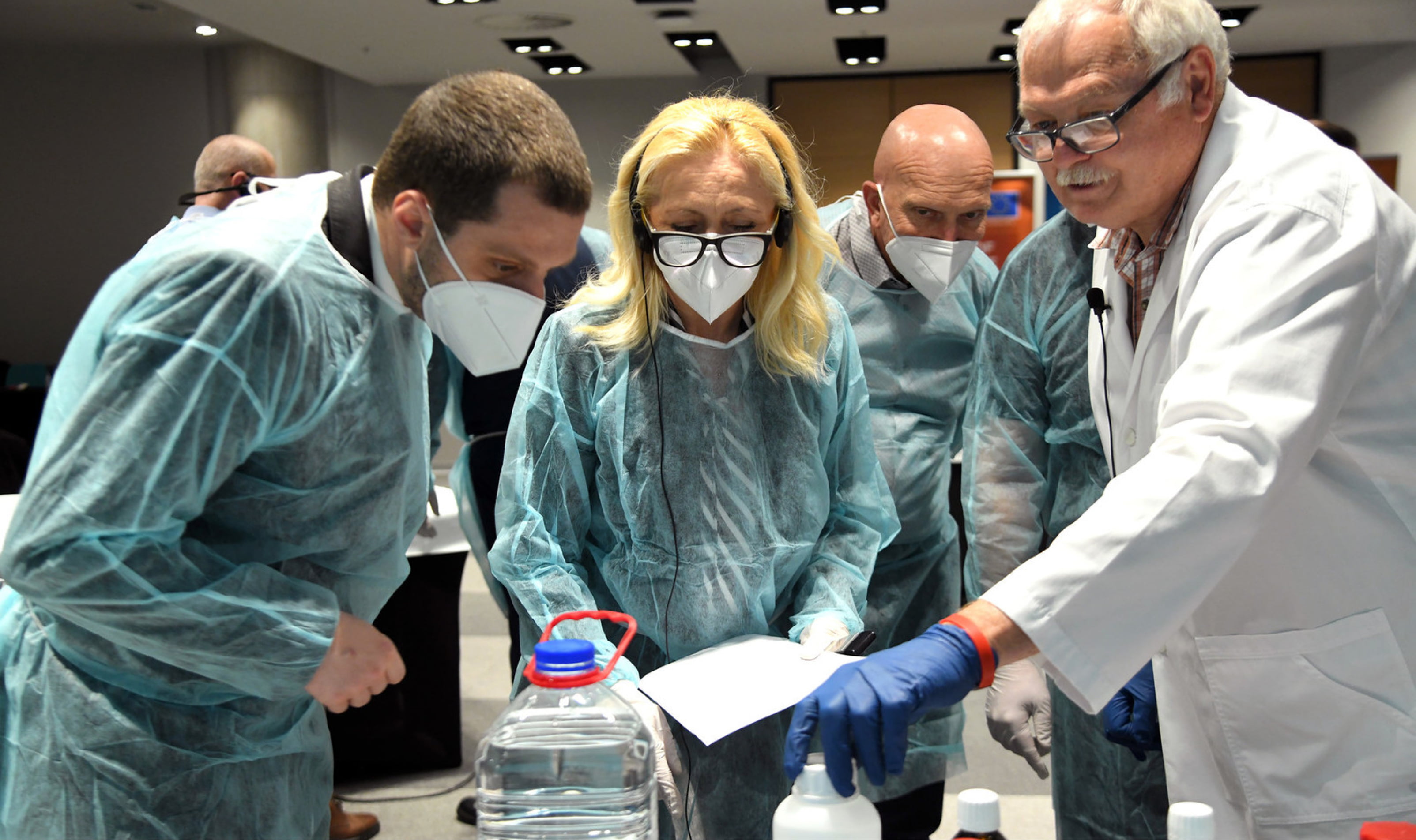
In cooperation with the National Ballistic Intelligence Service (NABIS) from the United Kingdom, SEESAC organized workshops in Belgrade and Tirana on weapon serial number restoration for representatives of Firearms Focal Points and Ballistic Lab

Strategic support
Technical support
Lessons learned
Effective coordination among all the stakeholders supporting the efforts of jurisdictions in SALW control and rigorous monitoring of progress are key precondition of success.
Looking forward
SEESAC successfully concluded the implementation of the initial Roadmap project, and was subsequently entrusted to continue coordinating and monitoring the implementation of the Roadmap and execute a package of comprehensive arms control activities across South-East and East Europe.
Addressing Gender-Based Violence in partnership with UNDP Seoul Policy Centre (USPC)
The UNDP Seoul Policy Centre (USPC), in coordination with UNDP’s Rule of Law, Security and Human Rights (ROLSHR) team, supported partner countries in their combat against gender-based violence to ensure the effective protection of women and children. The rights-based support mechanism for gender-based violence survivors and the relevant police capacity building programme of the Republic of Korea was shared with seven countries in partnership with the Korean National Police Agency (KNPA) and Sunflower Center, Korea’s one-stop service mechanism which provides counselling, psychological, medical, investigation and legal support to gender-based violence survivors. USPC’s technical support and catalytic seed funding facilitated the development and improvement of an integrated support mechanism for survivors and the establishment of protocols and training programmes for national police.
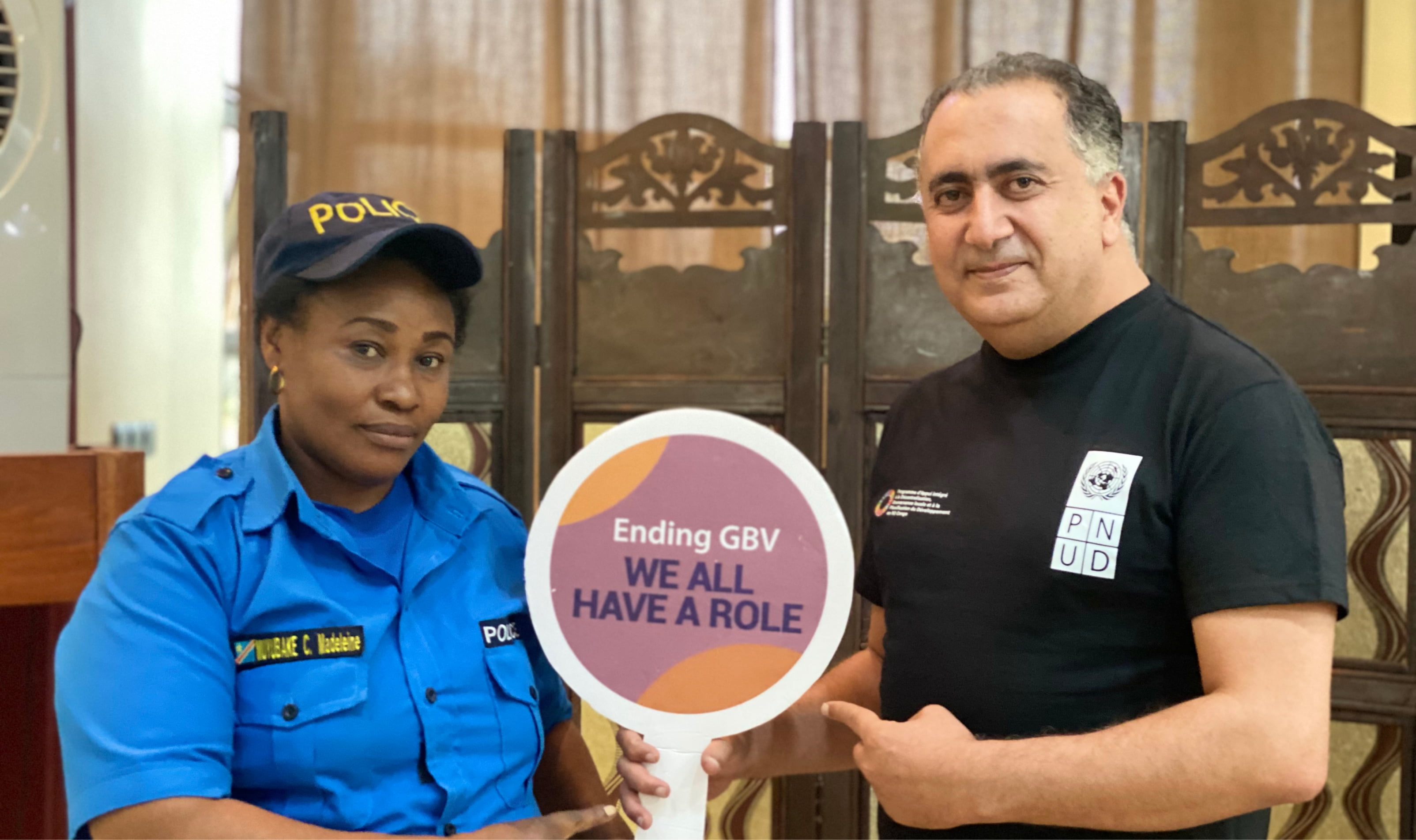
Field workshop for capacity building for GBV Legal Evidence Collection and Police within GBV multi-sectoral support setting, South Kivu Province, the Democratic Republic of the Congo

Technical support
Knowledge and thought leadership
Partnerships
Country highlights
The UNDP Country Office in the Democratic Republic of the Congo (DRC) and USPC collaborated to mitigate gender-based violence and discrimination towards gender-based violence survivors and female ex-combatants. A series of knowledge-sharing events were organized as a part of ongoing efforts to ensure an effective response from the Congolese National Police and facilitate awareness-raising and internalization of the survivor-centred approach.
A knowledge exchange workshop organized in March invited a wide audience from the police, legal and judicial sectors, as well as civil society organizations (CSOs), to exchange experience and knowledge on gender-based violence investigation and know-how in preventing secondary victimization. The good practices and lessons learned from Korea’s Sunflower Center were shared with 55 participants (including 22 women), and the workshop provided a venue for multiple stakeholders to exchange ideas and explore the potential for collaboration.
A series of field workshops were organized to train police officers from the Child Protection and Sexual Violence Prevention Squadron and the Technical and Scientific Police between October and November 2022. Ninety police officers from three provinces (Central Kasai, Kinshasa and South Kivu) deepened their knowledge of investigation/forensic evidence collection techniques and the principles of police responsibilities in multi-sectoral support to gender-based violence survivors. The trained officers are expected to cascade what they have learned in their respective units and further disseminate the knowledge gained through this workshop.
USPC’s collaboration with UNDP DRC synergized with the multi-year Korean International Cooperation Agency (KOICA)-funded programme, “Prevention and Holistic Response to Gender-Based Violence for Peace Consolidation in the conflict-affected regions in the DRC (2021-2026)”. Furthermore, the Congolese National Police established a new partnership with KNPA on enhancing criminal information analysis and management with KNPA’s funding for 2022 and beyond, based on the collaboration forged among USPC, KNPA, UNDP DRC, UN Police, as well as Congolese National Police.
Lessons learned
Coordination mechanisms between the capital and the provincial levels, as well as between different stakeholders, have gained importance. Despite strong national ownership and commitment visible at the headquarters level or in the main counterpart institution, the lack of coordination may lead to challenges in establishing a multi-stakeholder collaborative mechanism that can maximize the joint effort to eradicate gender-based violence. To mitigate this challenge, organizing a high-level nationwide advocacy event, for instance, may be considered as a means of stimulating multi-sectoral engagement.

Technical support
Funding support
Looking forward
In May 2022, USPC launched a new programme to support countries combatting gender-based violence in the digital sphere. Three partner countries (Bangladesh, Bosnia and Herzegovina and North Macedonia) were selected to receive seed funds and technical/advisory support in 2023-2024. USPC and KNPA, in coordination with the ROLSHR team, will share the Republic of Korea’s good practices and lessons learned in legislation and system reform, investigation techniques, victim-centred reporting and police response systems, victim protection mechanisms, police capacity building and training programmes, as well as public awareness raising and education programme development.
The Armed Conflict Location and Event Data Project, “ACLED Year in Review: Global Disorder in 2022”, (January 2023).
Humanitarian-Development-Peacebuilding and Partnership (HDPP) Facility for which the UN Peacebuilding Support Office (PBSO) serves as the Secretariat.
See INFOSEGURA, “Central America and the Dominican Republic: Preliminary analysis of the State of the Violence and Citizen Security”, (January to December 2022). Available at OP_RG_2022_ENG.pdf (infosegura.org).
See the SEESAC Website. Available at https://www.seesac.org/AVMP/.
See the SEESAC Roadmap Monitoring Website. Available at https://www.seesac.org/Roadmap-Monitoring/.

